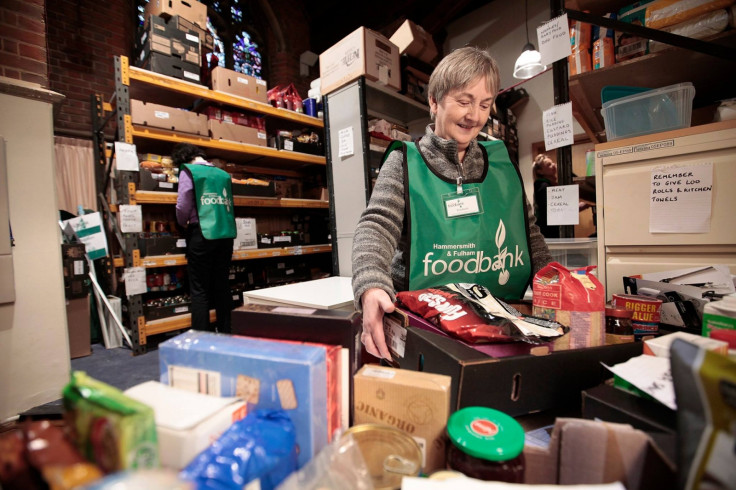Inequality may have narrowed but foodbank Britain is more divided by poverty than ever
The richest 10% of households hold 45% of all wealth.

News that inequality is falling should be a good thing. Any closure in the gap between the richest and poorest should be a sign that we are moving towards a healthier society, where people's lives don't look quite so different from their neighbours. Where someone does not go hungry in one street while another gorges themselves in the next.
That's what it should mean – but that isn't the picture painted by the figures released by the Institute for Fiscal Studies today.
While the difference between the highest and the lowest incomes may have reduced slightly, the news was of a county more divided than ever. Where poverty is so entrenched it is institutionalised as part of foodbank Britain.
The findings of the IFS are that in the poorest parts of the country – the Midlands, Wales and the north of England – incomes are still no higher than they were in the richest area – the South East – in the 1990s.
Meanwhile, 25% of all poor children live in the 10% most deprived areas. In fact, news that income inequality has reduced since the recession is simply due to the fact that wages in the City were suppressed. When we look at wealth – not just income – we see the richest 10% of households hold 45% of all wealth, with the poorest 50% owning just 8.7%.
The IFS report makes clear that poverty reduction has stalled so much it is at an historical low – a national disgrace. And while, according to the IFS, rising employment has helped reduce income inequality, more than 4 million people are still in insecure jobs that barely allow them to make ends meet. This is the picture that should not be masked by the headlines.
Both poverty and inequality are the inevitable consequence of the failure to ask who the economy is for – and a blind allegiance to growth, which suggests that if we just generate a bit more, then everyone's problems will be solved.
The truth is that they won't, even when we rightly redistribute the proceeds more. We also need to ask fundamental questions about what kind of wealth is being created and in whose interests it is being made.
To stand any real chance of making our country more equal we need to find ways to further reduce the gap between the highest and lowest incomes, and which will lock that process in for generations to come.
One obvious way to do this would be to significantly raise the Government's confusingly named National Living Wage for over 25s. This would transform lives – but we can and should go much further than that.
Instead of the scattergun approach of chasing growth in all sectors, we should be investing in high quality, secure jobs that bring real benefit to deprived areas. We could forge a Blue New Deal that rejuvenates our neglected coastal communities through offshore renewables, and a Green industrial strategy which tackles regional inequality.
Imagine an economy which is sustainable, built on renewable energy and resources, and gives control to local communities. One which builds strong resilient local economies that keeps money in a local area instead of seeing it sucked out by big interests.
Greens across the globe are also championing a universal basic income, a bold policy which would create a new social security settlement fit for the 21st century. A non-means tested payment to all people, a basic income would pull people out of poverty, support those unable to work and give people freedom to study or pursue the careers or ventures they really want to.
It would also reward unpaid work, which is often largely done by women, and enable people to leave the traditional workforce when they need to – such as to care for somebody.
A basic income would be more efficient than our current welfare system and would stop people needing to jump through hoops to access help and support should they suddenly find themselves in need.
Across the world, from Finland to Ontario, places are already piloting schemes for a basic income – with political will the UK could do this too.
It is within our power to decide how wealth is created who reaps the benefits. We need an economy that transfers power and control to those who need it most.
The economy should work for people, not against them. And the old, tired economic model simply won't tackle, let alone provide a lasting solution, to deprivation.
© Copyright IBTimes 2025. All rights reserved.






















